- Home
- Stephen L Carter
Palace Council Page 6
Palace Council Read online
Page 6
“To whom?”
“To anyone who believes in it,” said the librarian primly, a devoted Ethical Culturist.
Harlem at this time was shot through with secret societies, service organizations, and social clubs, some for men, some for women, some for both, and some, said the wags, for neither. But both Margot Van Epp and Philmont Castle were Caucasians, and Eddie knew nothing about the world of white clubs. A friend named Charlie Bing, a dentist, knew the Harlem club world better than anyone, but when Eddie inquired about symbols, Charlie coughed, and colored.
“Nobody talks about other people’s clubs. Or their own.”
Last shot. Eddie got in touch with a reporter from the Herald Tribune who, months before, had treated him to a decent lunch near Union Square and, on promise of writing a profile, solicited his views on everything from the rising generation of “college-educated” Negro writers to the likelihood that Negro voters would continue to desert the Republican Party in the forthcoming presidential elections. The promised profile never appeared, and the paper’s brief story about the “new” Negro writers had not mentioned Eddie Wesley. At the time, Eddie had been furious, and humiliated. Now he supposed that the reporter, a reasonably liberal sort, might be persuaded by the proper compound of charm and guilt to do him a favor.
“Sure, Eddie,” the man said, probably to get him off the phone.
But he proved to be as good as his word. The police report on Philmont Castle’s death, he said a week later over another lunch, this time Eddie’s treat, did not mention any piece of jewelry found on or near the body other than a wedding band. Personal items had long since been returned to the family, but the reporter had scribbled the inventory list from the evidence vault in his notebook. He allowed Eddie to take a look. Nothing about a cross. Nothing about anything clutched in the dead hand.
“I’ll tell you something funny,” the reporter added as they parted. “Now, you understand, we’re talking about a year-and-a-half-old murder—”
Eddie motioned this aside. “What is it? What happened?”
“The inventory list was torn out.”
“Torn out?”
“They keep these things in ordinary notebooks,” the reporter said. “You know, lined pages, like school kids use? Except this page was torn out. Torn out and then stuck back in with tape. Probably just wear and tear. It happens a lot.” He saw Eddie’s face. “Hey, is there a story here?”
“No story.” But he was thinking, as perhaps the reporter was, that it would be an easy matter to tear out one page and tape in its place another, copying the list of evidence but omitting an item or two.
“You sure? Because Harlem’s part of my beat. It doesn’t get covered too much in this town. We should do better. A juicy scandal might help.”
Eddie shook his head. He had learned at his father’s feet to mistrust the yearning for outrage that fired so much journalistic endeavor. Only many years later, when the violence was out of control, would it occur to him that by telling the story to a scandal-seeking reporter now, he might have helped avoid the worst. Instead he murmured his grave thanks and returned to Harlem.
Margot’s wedding to Lanning Frost made all the society pages, but Eddie could not tell from the grainy photos what, if anything, she wore around her neck.
CHAPTER 6
Czarinas in Training
(I)
“YOU SHOULD GO BACK to school,” said Mona Veazie, Aurelia’s closest friend. “When the baby’s old enough, I mean. Get your graduate degree.”
“Don’t be silly, dear,” said Sherilyn DeForde. “She has a Garland and a baby. All she should do for the rest of her life is bask in it.”
“Actually,” said the other Garland in the room, Claire—married to Kevin’s cousin—“she should ignore the rest of us and do what she wants.”
At which Sherilyn tittered, because she was a titterer.
Mrs. Aurelia Garland sat regally among the other women in the plush living room of her apartment at 409 Edgecombe Avenue. Regal, but terrified, and, as befitted royalty, she hid her terror behind a façade of delight. She dandled the baby. Her period of laying in was over, and she was receiving for the first time since Zora’s birth. She needed to receive. She needed to be among friends. She needed relief from the endless flow of clucking relatives—none of them hers—who failed, even collectively, to compensate for the absence of her husband. She was exhausted from the work of presenting to the world the face of radiant perfection as her husband crisscrossed the country, and occasionally left it, never saying when, or whether, he planned to return.
Sometimes the telephone would ring in the middle of the night and Kevin would leap wordless from the bed and vanish for a week. And yet he could be so sweet. He took her to sumptuous dinners. He introduced her to all the great men and women she had only heard of, because the Garlands knew everybody. They gave a party for Lena Horne. They gave a party for Sugar Ray Robinson. At a dinner on Long Island, she found herself seated beside Bob Hope. And Kevin still sang, off-key, all the songs with which he had seduced her in the first place: “It had to be youuuu,” he would croon, as they danced together in the front room. Or: “You maaaade me love youuu, I didn’t wanna do it.” One evening when Aurelia thought he was in Detroit he stepped into the bathroom as she climbed from the tub, assuaging her scream with a tender embrace and conjuring from behind his back a spray of long-stemmed roses. Two days later, he failed to come home after work, and when, close to midnight, Aurelia woke Kevin’s politely demeaning assistant, Thrush, she learned only that her husband had been called away for “consultations”—by whom, or to where, or on what, Thrush apologetically found himself unable to say.
So she received instead. Sitting in the parlor, she gathered a few friends and sought good-natured advice on what she should do now. The weather was summer-sultry. The windows were open and the radio was on. This was in keeping with an Edgecombe Avenue tradition: The great joke was that some of the apartments offered views of the Polo Grounds down the far side of the hill. During a Giants baseball game, you could sit in the Garland parlor with binoculars and watch. If you raised the window, you could hear the voice of the stadium announcer, and the roar of the crowd, and then, in scratchy echo, the same sound through your radio. Kevin had romanced her with stories of baseball, a sport he thoroughly loved, and had played in college. Now that the big leagues were integrated, all the Negroes listened. The Dodgers were the favorites, because of Jackie Robinson. Kevin used to watch another great Dodger, Don Newcombe, when he played for the Newark Eagles of the Negro Leagues back during the war. Kevin liked to tell how his Aunt Cerinda had suffered a heart attack one afternoon listening to the radio as Newcombe pitched to the Giants’ Willie Mays: she could not decide whom to root for.
Is that true? Aurie had asked, giggling.
Well, if it isn’t, said Kevin, it sure should be.
But when Aurelia met Aunt Cerinda, she turned out to be fortyish, and in excellent health. Cerinda worked in a bank in Detroit, spent every evening at church, and had never listened to a ball game in her life. In those days, Kevin’s propensity to play with the truth seemed charming.
In those days.
“Kevin is so happy,” said Sherilyn now, with an insider’s wink. “Walking around all the time with his chest puffed out.”
“You’re so lucky, dear,” said Chamonix Bing, with a quiet glance at Claire. “You married into the rich wing of the Garland family.”
“Although any Garland is a catch,” added Sherilyn, who had tried hard to snag one before settling for less.
“This craziness is going to be the ruin of our community,” said Mona, hardly looking up. “What ever happened to marrying for love?”
An uncomfortable silence. Mona was so silly that way, always stopping the conversation with her radical nonsense.
Finally, Claire Garland spoke up, the hefty peacemaker. “I married my Oliver for love, Mona, dear. And I rather suspect Aurie married her Kevin for love, too, didn
’t you, dear?”
Aurelia smiled, eyes lidded with exhaustion. She sipped her sherry.
“And at least now Kevin will leave you alone for a while,” said Sherilyn brightly, as if she had not been efficiently and implicitly skewered by Claire, already at thirty a sort of junior Czarina. “Men can be such a bother when they want a baby, can’t they? So demanding.”
Chammie Bing agreed. “They think because it’s pleasure for them it’s pleasure for us.” She waited for agreeing laughter. When none came, she rushed on, awkward grin failing entirely to hide her embarrassment. “But it’s just part of the cost of having a man, isn’t it?”
“Speaking of the bother,” said Mona, to Aurie, “I hear your ex-beau has been bothering Torie Elden lately.”
“Eddie,” clarified Chammie. “The one with no money.”
“Everybody bothers Torie,” said Sherilyn, who, along with Aurie, had shared a Harlem apartment with her. “And Torie bothers everybody.”
“Are you all right, dear?” murmured Claire, who could read the stoniest faces.
“I’m a little tired,” said Aurelia.
The women got up to go, kissing her cheek, chucking the baby’s chin. At the door, Aurie laid a hand on Claire’s fleshy arm and asked her to stay. Mona gave her a look—she was the one who was supposed to share Aurie’s secrets—but then her good nature won out, and she gave her friend a lingering hug. Aurelia understood what was going through Mona’s mind, but there was no way she could explain. She had asked Claire to stay because she needed to know the truth: did all the Garland men terrify their women, or was it just Kevin?
(II)
THAT NIGHT, Aurelia girded herself for battle. Kevin was in town, and would be home for dinner: she had Mr. Thrush’s word for it. She gave the maid the evening off and did everything herself. Set the dining-room table with the good silver. Made a spicy chicken fricassee with dumplings, a favorite of all the Garlands. Picked out what she hoped was a nice wine from Kevin’s collection. Ordered a strawberry cheesecake from the bakery down the block. Then she put on her slinkiest dress—although she did not feel terribly slinky since Zora’s arrival two months ago—and what Kevin liked to call her full paint job. She mixed the martinis and crushed the ice, then sat in the parlor, and waited.
All men need a period of adjustment after a baby, dear, Claire had murmured—although admitting, when pressed, that her Oliver, Kevin’s cousin, had not. Not every man who keeps a secret is up to no good— although everyone knew that Oliver could hardly wait to get home and tell his wife everything about his day, but only after listening to everything about hers. If the two of you are having problems, I can recommend somebody, said Claire, a pediatrician who worked half-time at Harlem Hospital. By this time, Aurelia could hardly wait to get Claire out of the apartment. And yet mixed in with all the useless advice came one nugget of gold: Oliver says that Kevin never calls any more.
He used to call?
All the time, dear. They were as close as brothers. And now they’re not.
Because Kevin was too busy? Or because Oliver disapproved of whatever he was up to?
She waited for Kevin, wandering through the dining room, to the kitchen, into the nursery to check on Zora, into the guest room, into the master bedroom, then back again, another circuit, as the hands of the grandfather clock in the front hall swept past seven, past eight, toward nine. At half past ten, the maid returned and found the mess where Aurelia had dumped the untouched dishes into the sink. She heard the sobs through the bedroom door but knew better than to knock. When Mr. Kevin got home, he would have to deal with it.
Aurelia woke around one-thirty, the slinky outfit ruined, her paint job now part of the duvet, to find her husband sitting in the bedroom chair, holding a shoe in his hand as if frozen in the act of undressing. All the lights were on. Kevin had a smooth, handsome heart-shaped face, almost feminine in its delicacy. He possessed no temper to speak of, and looked rather Byronic, but tonight the poet was a demon. Her husband had never laid a hand on her, although she supposed there was always a first time.
“I need a son.”
Aurie blinked. “What?”
“A son. An heir. I love you, but I have to know. Are you going to give me an heir or not?”
“What’s the matter with you?”
“What else you do is up to you. It makes no difference, as long as you don’t have another man’s child. I need a boy, Aurelia. Zora is fine as girls go, but I need a boy.” He was very drunk. He stood up, strode around the room, running both hands through his hair like a madman. “It’s urgent. They won’t wait. Tell me when you’re ready.”
He went out.
CHAPTER 7
Two Announcements
(I)
EDDIE WAS BOOKENDED by sisters. At Christmas of 1956, the family gathered in Boston. Marcella, the eldest of the children, arrived from western Massachusetts with husband and lively trio of pretty daughters, their hair flattened with a hot comb. Junie, the baby, unmarried at twenty-four (to her mother’s mortification), arrived alone, still in law school, one of many mad ideas Wesley Senior and his gentle wife, Marie, waited for her to outgrow. There were not enough positions in professional life for the men of the nation, the pastor would point out: should Negro women steal the few places that were allocated to the race? Junie, more lanky than graceful, had little of the easy allure of her older sister, or, for that matter, of her brother. The day might come, she said, when she would marry, if she met the right man. If not, not. Her secret plan, the one she used to whisper to Eddie when they were yet small and she would crawl into his bed after midnight to talk, was that she would become the first Negro and the first woman to be elected President of the United States. Imagine, Junie would say, the changes we could make. She told no one but Eddie, because she knew her big sister would tease her and her parents would gently nod at the follies of the imagination, then pile upon her strong back a heavier burden of chores in order to give her something to do.
At Christmas Eve dinner, before the late service at Wesley Senior’s church, the conversation was as thin as in any other year. Father and mother were shaking their heads over Representative Adam Clayton Powell’s surprise decision to support Eisenhower rather than the Democratic nominee, Adlai Stevenson, in the just-concluded election, for Powell, pastor of the largest church in Harlem, was at this time probably the most influential Negro in America. He had campaigned hard for the Republican President all across the country, drawing huge crowds. Eddie had no interest in politics. When Marcella brought up the year-old Montgomery bus boycott, which had ended just four days ago, following a ruling by the Supreme Court, her brother responded with vaguely remembered jargon from his courses at Amherst: the powerful were only fiddling with the superstructure, he said, hoping he had the terminology right. For the great mass of their people, nothing had changed.
Wesley Senior eyed his son coldly. “Your attitude is inexcusable, Edward. A young man whose career is at last succeeding should view the world through the lens of gratitude, not cynicism.” This was the great pastor’s way of acknowledging the critical acclaim that greeted his only son’s first novel, published six months ago, for the family had never evolved a proper etiquette for expressing pride.
In the general silence that followed, Junie surprised the table with the news that she had secured a clerkship with a federal district judge in Chicago. Nobody but Eddie knew what she meant. Nobody but Eddie congratulated her. Marie covered her mouth. Marcella, busy breaking up a dispute among her children, paid no attention. Her husband, Sheldon—known among the family as “the undertaker,” and the marriage itself inevitably “the undertaking”—turned mournful eyes Junie’s way as though measuring her for a casket: perhaps her madness might take a fatal turn. Wesley Senior vouchsafed his son a foul look, then grumped that they had spent far too much money paying tuition for his daughter to serve as a mere clerk. Actually they had not. The deacons each year took up a special collection for the amount of Junie’
s tuition. There was never a shortfall. The congregation was large. Wesley Senior was much respected, and his family was much loved.
Junie started to explain that judicial clerkships were few, and much sought after, opening the door to fantastic career possibilities, but her father ignored her. If she insisted on this law nonsense, said the pastor, she should at least get a serious job, working perhaps for one of the large firms in the city. Junie pointed out that few of them had ever hired a Negro lawyer. She doubted that even her forthcoming Harvard degree would change their attitudes. Her father colored. He did not want excuses, he said. He wanted results. Eddie objected that prejudice was fact, not excuse. Wesley Senior repeated a favorite story, about the Negro who went down to a radio station to apply for a job as an announcer. He failed. Asked why, the man said, “B-b-b-because I’m b-b-b-black.” Nobody laughed. Everyone had heard it too many times. One of Marcella’s daughters made the unfortunate choice of this instant to display her uncommon gift for mimicry, replicating her grandfather’s words with near-perfect intonation, if without any sure knowledge of what he had meant. Marcella snapped at the child. Marie said not to be so hard on her. Wesley Senior’s voice at once cracked like a rifle shot: Do not, he said, correct the mother in front of her daughter. Junie snickered and, when her father’s heavy gaze burned her way, pointed out that he had just done precisely what he told his wife not to.
“When I do it,” he rumbled, “it is not the same. I am master of the house and head of the family.”

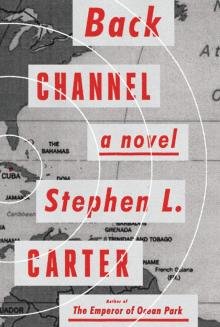 Back Channel
Back Channel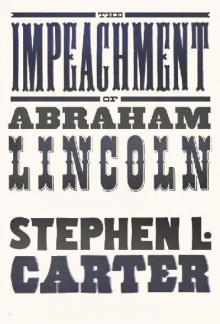 The Impeachment of Abraham Lincoln
The Impeachment of Abraham Lincoln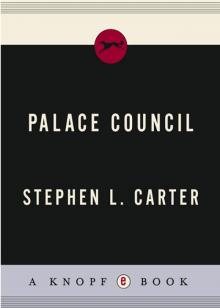 Palace Council
Palace Council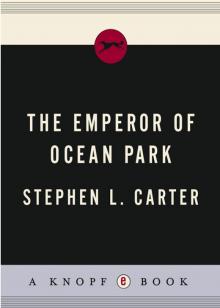 The Emperor of Ocean Park
The Emperor of Ocean Park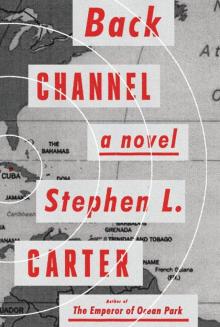 Back Channel: A novel
Back Channel: A novel Emperor of Ocean Park eh-1
Emperor of Ocean Park eh-1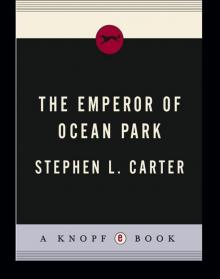 Emperor of Ocean Park
Emperor of Ocean Park